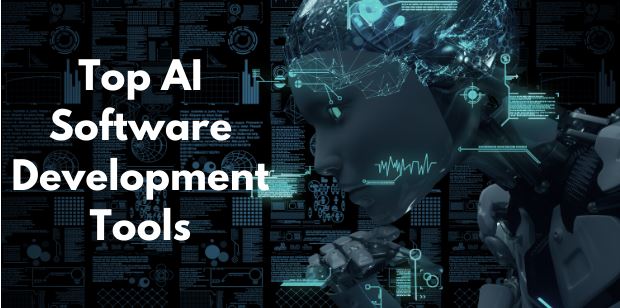What are the Top AI Software Development Tools ?

With the expanding involvement and growth of Artificial Intelligence, the programming of codes has slightly shifted, it is not just instruction-deliverance anymore, it is instructions-data-machine learning- artificial intelligence deliverance now.
AI tools are naturally up for dominating the market and they are succeeding. Artificial Intelligence has facilitated the processing of large amounts of data and it is an application of individual technologies operating in tandem, allowing the computer to perform actions generally reserved by humans.
AI can be used in software development for a multitude of purposes, here are some
1. Automated Debugging
AI software and tools can be used for automated debugging through patterned detection for an in-depth analysis, identification, and categorizing of error types. The deep learning algorithm can easily flag-off errors and speed up the debugging procedure.
It can even learn to fix each type of bug with sufficient data. Post-training, the machine will be automatically able to spot and correct a large number of errors.
Take auto text correction, for example, it is present in all smartphones, even in desktop devices, our mistakes are not only highlighted and corrected but our feedback and additions are also taken in resulting in the system performing better for us.
2. Smart Assistants
Apple Siri and Google Assistant are perhaps the two best examples of smart assistants and such I software assistants are fast gaining popularity among smartphone users since they intelligently fasten the development process.
AI software assistant tools can play the role of a trainer and come up with recommendations, offer code examples and prevent simple coding mistakes.
3. Automated Code Generation
Must have heard of it if you keep up with the world of web and app development. Coding from the scratch can be tiresome and labor-intensive. So here comes AI software programs for automated code generation to combat such issues. Even though a lot of work is still to be put on this, it can reduce a significant amount of workload once the software masters the underlying patterns, and they are faster in it than human beings. In the future, AI software has the potential to replace the task of junior software programmers.
4. Intelligent Testing
Throughout the development cycle, testing has been one of the most crucial elements while you build a quality software product. The software programmers face the major challenge of creating a thorough list of use-cases as well as situations impacting the performance of the program.
AI software tools can perform this by going through the previous logs and automatically generating a list of test-cases for running through the system. It can also predict the outcomes of testing without even performing an actual test.
5. Designing Strategy
AI software development tool, trained on past software development projects and business factors can analyze existing software and find a solution- fulfilling the requirements of both clients and software engineers.
Top Software Development Tools Using AI
1. TensorFlow
TensorFlow is an open-source numerical computation tool, primarily for production and research. It is backed-up by community support, adding to the functionality of the tool. It utilizes the arrangement of a multi-layered hub that enables you to rapidly set-up, train, and send counterfeit neural systems and huge datasets.
The only downside is that it takes time to learn this AI software.
The AI-based solution can be deployed on the following:
- Desktops
- Clusters
- Mobiles
- Edge Devices
- CPUs, TPUs, and GPUs
2. H20.AI
It is an open-source learning platform, this AI software is business-oriented and helps them to make decisions based on data and enables the users to draw insights.
H20.AI is used for predictive modeling, risk and fraud analysis, insurance analytics, etc.
3. Cortana
An AI-enabled voice-researched assistant which performs various tasks such as answering queries, setting reminders, and others.
Its voice recognition feature proves to be a time-saver and also supports different operating systems such as Windows and iOS.
Highlight Features:
– Supports a wide range of tasks such as switching lights, placing orders
– Takes voice inputs
– Uses Bing Search Engine
– Supports multiple languages
4. IBM Watson
IBM Watson is a question-answering software that extends support to SUSE Linux Enterprise, Server 11 OS using the Apache Hadoop framework.
Post-training the project model with Watson, it deeply understands the core notion. It is a robust system making business processes smarter.
Highlight Features
– Supports distributed computing
– Can operate with existing tools
– Provides an API for app development
5. Infosys NIA
It accumulates organizational data in a legacy system and piles it up in a self-learning knowledge-base. Analysts and software developers can leverage for creating high-performance, scalable ML models.
Highlight Features
– Extensibility for data preparation, visualization, and machine learning methods
– Elastic cloud deployments
– Streaming fast predictions
6. Deeplearning4J
It is an open-source, customizable, and distributed deep learning library written by Java and Scala. It is developed as a plug-and-play AI software for faster prototyping.
Highlight Features
– Can be utilized in business environments on distributed GPUs and CPUs
– Tailored to fit into the microservice architecture
– Python, Java, and Scala APIs
– Imports neural net models from other frameworks
7. Google Assistant
The most popular is a virtual assistant by Google which can be utilized on smartphones and smart devices. It supports iOS, Android, and KaiOS.
Even supports various major languages.
Highlight Features
- Browses for information with the support of Google search engine
- Supports two-way communication
- Sets alarms and reminders
- Schedules events
- Displays Google Account Information
- Can recognize songs, objects and read visual information
These are some of the best AI software development tools that we can look forward to as platforms for software developers to solve real-life problems which will make the underlying architecture better and more robust.




